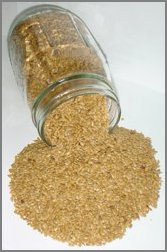Flaxseed: The Incredible Health Benefits (and One Drawback) of Flaxseed and Flaxseed Oil
by www.SixWise.com
Tiny seeds known as flaxseeds have been sprouting up on health
food store shelves and in cupboards of health-minded people
for years now, but they're still relatively unknown to most
Americans.
Flax, the plant, dates back to the Stone Ages and was used
in both ancient Greece and Rome for cooking and medicinal
purposes, but the seeds fell largely out of favor after the
fall of Rome.
|

Flaxseeds may be tiny, but they pack a powerful nutritional
punch.
|
In modern times, flaxseeds have earned a name for themselves
as a tiny seed that packs a powerful punch. In terms of appearance
they're not that unique; they're a little bigger than a sesame
seed with a shiny shell that ranges in color from amber to
reddish brown.
On the inside, however, is a complex blend of essential fatty
acids, phytoestrogens, fiber and more, that has the capabilities
of fighting off everything from inflammation to heart disease
to cancer -- with only one slight drawback.
Flaxseeds and Omega-3 Fat
If you have heard of flaxseeds, chances are it was in association
with the term omega-3. That's because flaxseeds are rich in
alpha linolenic acid (ALA), a type of omega-3 essential fatty
acid. Just two tablespoons of flaxseed will give you over
140 percent of the recommended daily value of ALA.
However, you've also probably heard of omega-3 fats in fish
oil, cod liver oil and krill oil. These animal-based omega-3
fats are called DHA (docosahexaenoic acid) and EPA (eicosapentaenoic
acid), and it's these two forms of omega-3 that seem to be
responsible for most of the benefits, such as helping to prevent
heart disease, cancer, diabetes, depression, Alzheimer's disease
and more.
Getting back to flaxseeds, ALA is a precursor to EPA, which
means it is converted to EPA in your body. When converted,
it can provide the benefits that EPA has to offer, BUT
only a small percentage actually gets converted. Why?
This process requires the presence of a certain enzyme --
delta-6-destaurase -- that is less active in some people.
Having diabetes and consuming saturated fat and/or alcohol
can also inhibit the activity of this enzyme.
So, in order to receive the same benefits of the omega-3
in fish oil, cod liver oil or krill oil, you would need to
take in A LOT of flaxseeds. This is the drawback that
we've referred to, as flaxseeds are often -- and somewhat misleadingly
-- thought of as a superior form of omega-3 fat.
Though not the best source of DHA and EPA, flaxseeds do have
a number of other redeeming qualities.
Ward Off Cancer, Heart Disease, Inflammation and Diabetes
The omega-3 fats that flaxseeds do contain can help to reduce
the formation of blood clots, which then reduces the risk
of heart attack and stroke.
They're also useful for preventing and treating diabetes,
because omega-3 fats help produce flexible cell membranes.
This helps to let nutrients in and waste out, unlike a stiffer
membrane that can result from eating too many trans
fats.
This is essential for the health of everyone, but becomes
even more crucial with diabetes. A flexible cell membrane
makes it easier for cells to respond to insulin and absorb
glucose.
Omega-3 is also thought to protect colon cells from toxins,
which reduces the risk of colon cancer.
In addition, omega-3 fats help to reduce inflammation,
which is present in osteoarthritis, asthma, rheumatoid arthritis
and migraine headaches.
|

Good news for women; flaxseeds may help to balance
your hormones.
|
Again, flaxseeds do not contain as much of the beneficial
omega-3 fats EPA and DHA as fish oil, cod liver oil and krill
oil, but every little bit helps.
Women, Flaxseeds Fight Hormone-Related Cancers and Promote
Hormonal Balance
Flaxseeds contain phytoestrogens
called lignans. These compounds are converted into two hormone-like
substances that appear to fight breast cancer and other hormone-related
cancers. Researchers also believe that ALA and lignans may
work together to prevent disease.
Flaxseed contains more lignans than any other plant source
known -- with about 500 times more lignans than wheat bran,
rye, buckwheat, millet, soybeans and oats.
Further, the lignans also help to promote normal ovulation
and lengthen the second half of the menstrual cycle. It is
during this time that progesterone is the dominant hormone,
and lengthening this period provides a number of beneficial
effects that ultimately help to restore hormonal balance.
Lots of Fiber
Flaxseeds are also loaded with beneficial
fiber, which helps to:
- Relieve constipation
- Lower cholesterol levels
- Protect the colon from cancer-causing chemicals
- Stabilize blood sugar levels in people with diabetes
How to Get Your Flaxseed
Flaxseeds are available in three distinct forms:
- Ground seeds
- Whole seeds
- Flaxseed oil
Flaxseeds are highly perishable, and while ground seeds are
convenient, the whole seeds will stay fresh longer. To use
whole seeds, first sniff them to make sure they haven't gone
rancid (rancid flaxseeds will smell like oil-based paint).
You will then need to grind them using a coffee or seed grinder
or mini food processor. Only grind as much as you plan to
use up immediately.
If purchasing pre-ground seeds, be sure to store them in
an airtight container in the refrigerator or freezer. Whole
seeds should also be stored this way. Because the seeds are
so perishable, you should only purchase ground seeds that
are stored in the refrigerated section of the store.
Flaxseed oil is the most perishable form of all. It should
only be purchased in opaque bottles that have been kept refrigerated,
as otherwise the oil could easily be rancid. Flaxseed oil
should not be used for cooking -- only for cold foods or added
to hot foods after they've been cooked. Remember that if you
use flaxseed oil, you will not get the beneficial fiber found
in the ground or whole seeds.
Cooking With Flaxseeds
Flaxseeds have a nutty flavor that lends itself well to muffins,
breads, pancake mixes, cookies and more. They can also be
added, in ground form, to cereals, smoothies and vegetables.
If you'd like to introduce flaxseeds to your family, try out
the two tasty recipes below!
Sources
World's
Healthiest Foods
Whole
Health MD